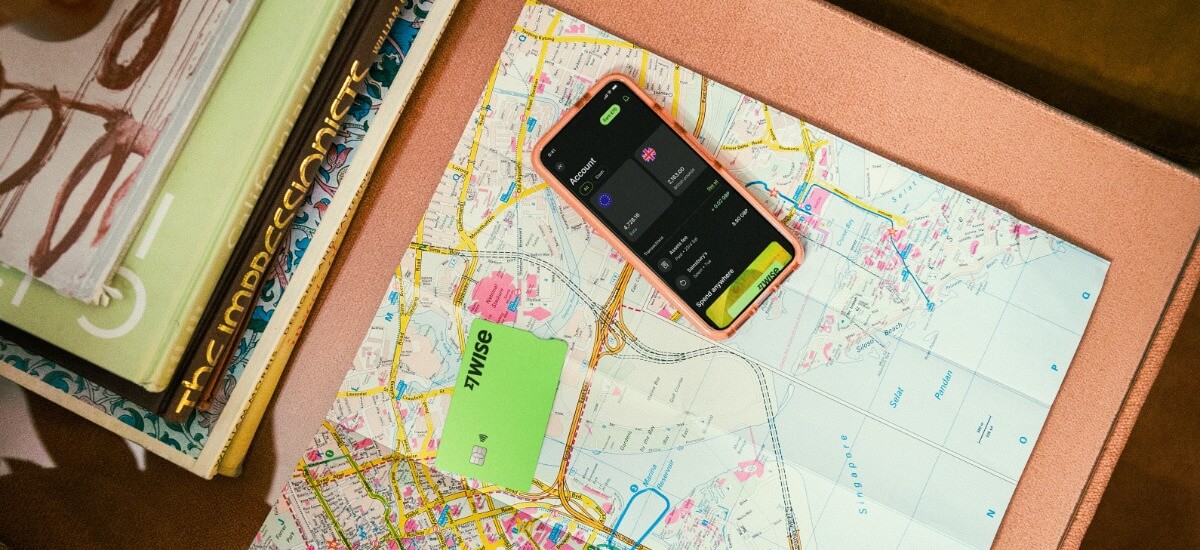How much is a security deposit? 2025 guide
Everything you need to know about security deposits

Portugal has become increasingly popular with American expats who want to live a more European lifestyle on a lower budget than what's realistic in major hubs like Paris or Barcelona. With its Mediterranean climate and stunning coastline, Portugal mixes Old World charm with a high standard of living.
The Portuguese real estate market is growing steadily, so there are plenty of opportunities for Americans, but also important things to be aware of to avoid costly mistakes.
Here's everything you need to know about buying a house in Portugal as a foreigner.
| We'll also introduce Wise — your international money transfer solution. Use Wise to send stress-free, high amount transfers to Portugal - all at the standard mid-market exchange rate. |
|---|
| Table of contents |
|---|
Yes, Americans can buy Portuguese property, and there are no special restrictions or additional requirements for foreign buyers.
Over 75% of people in Portugal own their homes, and many of them are foreigners living, working, or retiring in Portugal.¹ There's a growing digital nomad population, too.
To purchase property, you only need a Portuguese value-added tax (VAT) identification number — número de identificação fiscal (NIF) or número de contribuinte. You can get it by opening a Portuguese bank account or visiting a local tax office.
| 💡 Learn more about buying property abroad as an American in our full guide. |
|---|
The only thing you should keep in mind is that buying a house in Portugal and moving to Portugal permanently are two different matters.
As of October 2023, property purchase no longer qualifies you for Portugal's Golden Visa program, which was previously a popular path to residency.¹
So, you'll need to explore other options to get Portuguese residency. These can include:
- Golden Visa through other investments (minimum 250,000 EUR)²
- Digital Nomad Visa for remote workers
- Retirement visas
- Work visas
- Student visas
- Family reunification
💡 If you don't plan on living in Portugal year-round, you can experiment with turning your house into a property rental. With Portugal's booming property market, this can be a great source of additional, mostly passive income.
Real estate investments in Portugal are typically a good idea, but there are still pros and cons to consider. Here's what to expect.
Pros:
Strong rental potential: Property in Portugal generates average rental yields of 4.45%.³ However, you'll need proper permits and must meet safety requirements to rent legally
Growing market value: Portugal’s real estate market has been growing, especially in popular areas like Lisbon and Porto
High living standards: Portugal has high-quality health care, good education systems, and a lower cost of living compared to most Western European countries
Expat community: There are large communities of international professionals, digital nomads, and retirees, which makes it easier to adjust to life in Portugal
Accessible location: Portugal has easy access to the rest of Europe as well as the US, so you can travel to see family or for work purposes
So, if you're considering buying a house in Portugal, there are many things to look forward to. That said, there are also some pitfalls.
Cons:
No Golden Visa through property: Recent changes mean that buying a house in Portugal no longer qualifies you for residency through the Golden Visa program. It still does in other Golden Visa countries
Taxes on rental income: If you decide to rent your house out, it'll be subject to a special tax rate of 28%⁴
Maintenance considerations: If you buy an older house, it can require significant upkeep and renovation costs. If you don’t plan for this, it can drain your budget
Cultural adjustments: Portugal has a relaxed pace of life, which is great, but it can also be frustrating when handling important personal or business matters
For a successful property purchase, make sure to evaluate all of the pros and cons and consult with a local real estate agent or an attorney.
You could also consider renting in Portugal first to get a better sense of how living there feels.
Generally speaking, Portuguese property prices are lower than in many other European countries. For example, you might pay 12,168 EUR per square meter in central Paris, but prime locations in Lisbon cost about half that amount, and smaller Portuguese cities are even more affordable.⁵
If you're wondering where to buy a house in Portugal, here are the prices you can expect in a few major cities.
| City | Price per m² (city center) | Price per m² (outside center) |
|---|---|---|
| Cascais⁶ | 6,750 EUR | 4,800 EUR |
| Lisbon⁷ | 6,461 EUR | 3,637 EUR |
| Porto⁸ | 3,954 EUR | 2,905 EUR |
| Coimbra⁹ | 2,681 EUR | 1,462 EUR |
| Braga¹⁰ | 2,258 EUR | 1,649 EUR |
| 🔍 Wondering how much that would cost in USD? Check out this handy conversion calculator: |
|---|
As you can see, Lisbon and nearby Cascais come with the most expensive real estate prices. Cities like Braga and Coimbra are great if you're looking for more affordable options. Porto, Portugal's second-largest city, is squarely in the middle.
Keep in mind that these prices are just averages. As in all other places in the world, there are luxurious properties that cost much more than that as well as more affordable options — especially in areas that aren't too popular with tourists.
Before making your decision, try living in different Portuguese cities and neighborhoods to see which ones you like best.
Beyond the property price, you'll need to budget for a few fees and expenses. Here's what you can expect.
| Expense | Amount¹ |
|---|---|
| Deed registration | 1% |
| Mortgage arrangement (if applicable) | 1% |
| Mortgage administration (if applicable) | 1% |
| Nonrefundable commitment fee | 600 EUR |
| Survey and appraisal | 500 - 800 EUR |
| Legal fees | 1,000+ EUR |
Foreign property buyers should also expect to make a larger down payment if they're getting an overseas mortgage — more on this later.
💡 If you need to get residency in Portugal through investment, the minimum investment starts at 250,000 EUR.²
You don't need to get residency in Portugal to buy a house, but you won't be able to live in it year-round without it. So, if you want to move to Portugal permanently, look into different visa options and how much they’re going to cost you.
Buying and owning a house in Portugal comes with several important taxes. Here's the breakdown.
| Tax type | Rate |
|---|---|
| Municipal Property Tax (IMI)¹ | 0.3% to 0.45% |
| Property Purchase Tax (IMT)¹ | 2% to 8% |
| Stamp Tax (IS)¹ | 0.4% to 0.8% |
| Rental income tax⁴ | 28% |
These taxes can look different depending on your property type and location, and you may also qualify for certain exemptions.
It's a good idea to consult with a qualified lawyer to get an accurate picture of the real estate taxes that come with owning property in Portugal in your particular situation.

Now that we covered some of the basics, the only question left is: how to send money to pay for your property overseas?
Wise offers you a quick, secure, and transparent way of sending money to Portugal. You get the mid-market exchange rate for your payments and see how much it’s charged for the transfer before sending the money from your bank.
With the Wise Account, you can also hold 40+ currencies, spend money in 150+ countries, and receive like a local in 9 different currencies.
Please see Terms of Use for your region or visit Wise Fees & Pricing for the most up-to-date pricing and fee information
The steps to buying a house in Portugal are somewhat similar to buying in the US, but there are a few unique Portuguese requirements and documents you'll need to prepare.
Here's what you can typically expect.
Step 1. Research mortgages
If you need a mortgage, prepare your proof of income and bank statements and head over to your bank to get mortgage preapproval. This will help you understand your house shopping budget.
As a foreigner, you should expect to make a 25% to 35%+ down payment¹
| 💡 Learn more about how to get a mortgage in Portugal in our full guide. |
|---|
Step 2. Find your property
You can search on Portuguese real estate sites like Idealista or Imovirtual, and you should also consider working with a local real estate agent.
Step 3. Inspect and verify the house
Once you find a property you like, hire a surveyor to inspect and get a lawyer to review property documents, verify its registration and tax status, and check for any liens or debts.
Step 4. Make an offer
If the house checks out, submit your offer through your agent — they can help you draft it. You can negotiate the price and conditions, but make sure to get all agreements in writing.
Step 5. Get final mortgage approval
Submit all required paperwork to the bank and secure final mortgage approval.
Step 6. Sign the sale contract
Sign the Contrato de Promessa de Compra e Venda — it's a legally binding document.
Step 7. Put down your deposit
Transfer the agreed deposit amount and agree on the completion date with the house's seller.
Step 8. Pay your taxes
Pay the IMT (property transfer tax) before the final deed signing.
Step 9. Sign the final deed
Sign the Escritura Publica de Compra e Venda, register the house in your name, and receive your keys and property documentation.
When buying a house in Portugal, pay attention to maintenance issues like dampness and mold (because of Portugal's coastal climate) and heating and cooling (many Portuguese homes weren't built with central heating or air conditioning). Don't be afraid to ask questions!
Typically, buying a house in Portugal takes between 1 to 4 months.¹¹
Sometimes, you can run into mortgage approval delays, property chain complications, or extra requirements for foreign buyers, which can naturally make the timeline longer. Holiday periods can also slow things down.
In Portugal, paperwork and official approvals can sometimes take longer than expected, so it's a good idea to plan for some extra buffer time.
There are no restrictions on foreign property ownership in Portugal, but getting a mortgage is much more challenging than buying in cash.
There are no specific laws that prevent Americans from getting a mortgage in Portugal, but most banks will likely offer you lower loan amounts with higher interest rates than what you'd expect to get in the US.
Locals can typically borrow up to 90% of the property value, but nonresidents usually qualify for only 65%-75% of the property value or purchase price.¹ If you don't have many ties to Portugal, you may not qualify at all.
Banks offer both fixed-rate and variable-rate mortgages.
- Fixed-rate mortgages: Set interest rate for the entire loan term
- Variable-rate mortgages: Interest rate adjusts based on market conditions
To get a Portuguese mortgage, start by preparing your financial documents and getting them translated (if they're in English). Then, contact multiple banks to compare rates.
Here are the documents you'll typically need:
- Valid passport
- Portuguese tax number
- Proof of income
- Bank statements
- Credit report from the US (or another country of residency)
- Employment contract or business documentation
- Proof of other assets or investments
- Life insurance policy
Overall, getting a mortgage in Portugal can be difficult, but it's not impossible.
It can also be a good idea to look into working with an international mortgage lender.
If you've been wondering "How to buy a house in Portugal?", now you know that it's a relatively straightforward process with no major restrictions for US buyers.
Property purchase costs in Portugal are more affordable than in many European countries, especially outside Lisbon and Cascais, but you'll need to budget for extra costs like property taxes and various fees.
If you're moving to Portugal and need a way to easily send money there and convert between USD and EUR, try Wise.
Sources
*Please see terms of use and product availability for your region or visit Wise fees and pricing for the most up to date pricing and fee information.
This publication is provided for general information purposes and does not constitute legal, tax or other professional advice from Wise Payments Limited or its subsidiaries and its affiliates, and it is not intended as a substitute for obtaining advice from a financial advisor or any other professional.
We make no representations, warranties or guarantees, whether expressed or implied, that the content in the publication is accurate, complete or up to date.

Everything you need to know about security deposits

Learn all about different ways to get an overseas property mortgage as an American and gain unique insights to prepare yourself for the whole process.

Get a full overview of the best property management software systems for small landlords to easily track and manage their overseas property.

How to buy your first rental property overseas? Here's a detailed guide that can help you understand the challenges and steps for making an investment.

What are the best property management software systems for managing student housing? Take a look at our list and choose the most suitable option for you.

Are you thinking about making smart property investment decisions and wondering how rental yield is calculated? Have a look at our guide to find out.